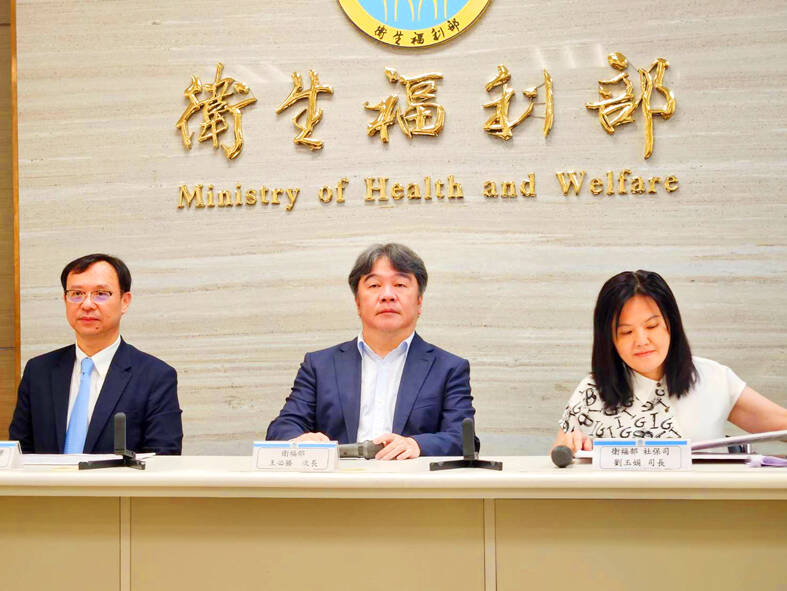The National Health Insurance Administration (NHIA) plans to set up a specialized office to speed up the process of adding new drugs to National Health Insurance (NHI) coverage, administration Director-General Shih Chung-liang (石崇良) said yesterday.
As new drugs are being developed that are relatively expensive, several medical welfare groups and patients’ associations, including the Formosa Cancer Foundation and Taiwan Young Patient Association, have urged the government to set up a special fund to help cover medical expenses for the new drugs and speed up the NHI coverage review process.
The groups have said it takes about two years for new cancer drugs to be assessed and included in the list of drugs covered by the NHI.

Photo: CNA
New drugs currently need to pass a review and obtain a drug license from the Food and Drug Administration (FDA) before applying to the administration for NHI coverage.
Shi said the specialized office would speed up the review of new drugs — especially those for unmet medical needs, breakthrough therapies, or which have a longer-lasting effect and can replace current drugs.
Hopefully the office would start operating in January next year, he said, adding that its main functions would be to conduct health technology assessments of new drugs, gather clinical data on new drugs that are temporarily covered by the NHI for future assessment, database management and training personnel to assist drug companies in providing the correct information in their report.
The proposed budget for the office is NT$100 million (US$3.14 million) for the first year, and the number of office personnel would be expanded from eight administrative personnel at present to about 100, including specialists in health economics, statistics and database management, Shi said.
With the FDA and the office reviewing the drugs simultaneously, the goal is to reduce the process to one year, he said.
As the office would be handling sensitive personal information when gathering clinical data, the next phase should be to establish an administrative agency, similar to the British National Institute for Health and Care Excellence, but legislation would be required for that, which would take about three to four years, Shi said,
As the UK has the Cancer Drugs Fund and the Innovative Medicines Fund, which provide interim funding for patients to gain access to promising new drugs faster, the administration also hopes to set up a new fund for drugs that is separate from the NHI global budget, Shi said
He said about 80 percent of the new drugs funded by the Innovative Medicines Fund later passed review and were covered by the British National Health Service, so the new drugs fund could cover new drugs where some uncertainties remain regarding their therapeutic effects, and further data and assessment is required.

An essay competition jointly organized by a local writing society and a publisher affiliated with the Chinese Communist Party (CCP) might have contravened the Act Governing Relations Between the People of the Taiwan Area and the Mainland Area (臺灣地區與大陸地區人民關係條例), the Mainland Affairs Council (MAC) said on Thursday. “In this case, the partner organization is clearly an agency under the CCP’s Fujian Provincial Committee,” MAC Deputy Minister and spokesperson Liang Wen-chieh (梁文傑) said at a news briefing in Taipei. “It also involves bringing Taiwanese students to China with all-expenses-paid arrangements to attend award ceremonies and camps,” Liang said. Those two “characteristics” are typically sufficient

The brilliant blue waters, thick foliage and bucolic atmosphere on this seemingly idyllic archipelago deep in the Pacific Ocean belie the key role it now plays in a titanic geopolitical struggle. Palau is again on the front line as China, and the US and its allies prepare their forces in an intensifying contest for control over the Asia-Pacific region. The democratic nation of just 17,000 people hosts US-controlled airstrips and soon-to-be-completed radar installations that the US military describes as “critical” to monitoring vast swathes of water and airspace. It is also a key piece of the second island chain, a string of

A magnitude 5.9 earthquake that struck about 33km off the coast of Hualien City was the "main shock" in a series of quakes in the area, with aftershocks expected over the next three days, the Central Weather Administration (CWA) said yesterday. Prior to the magnitude 5.9 quake shaking most of Taiwan at 6:53pm yesterday, six other earthquakes stronger than a magnitude of 4, starting with a magnitude 5.5 quake at 6:09pm, occurred in the area. CWA Seismological Center Director Wu Chien-fu (吳健富) confirmed that the quakes were all part of the same series and that the magnitude 5.5 temblor was

The Central Weather Administration has issued a heat alert for southeastern Taiwan, warning of temperatures as high as 36°C today, while alerting some coastal areas of strong winds later in the day. Kaohsiung’s Neimen District (內門) and Pingtung County’s Neipu Township (內埔) are under an orange heat alert, which warns of temperatures as high as 36°C for three consecutive days, the CWA said, citing southwest winds. The heat would also extend to Tainan’s Nansi (楠西) and Yujing (玉井) districts, as well as Pingtung’s Gaoshu (高樹), Yanpu (鹽埔) and Majia (瑪家) townships, it said, forecasting highs of up to 36°C in those areas